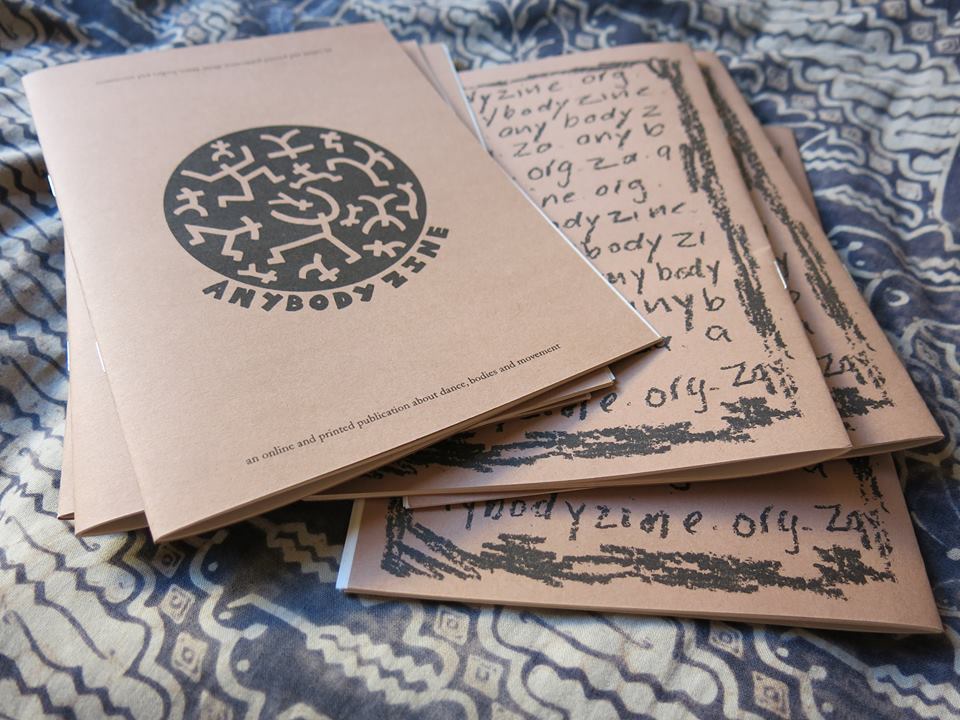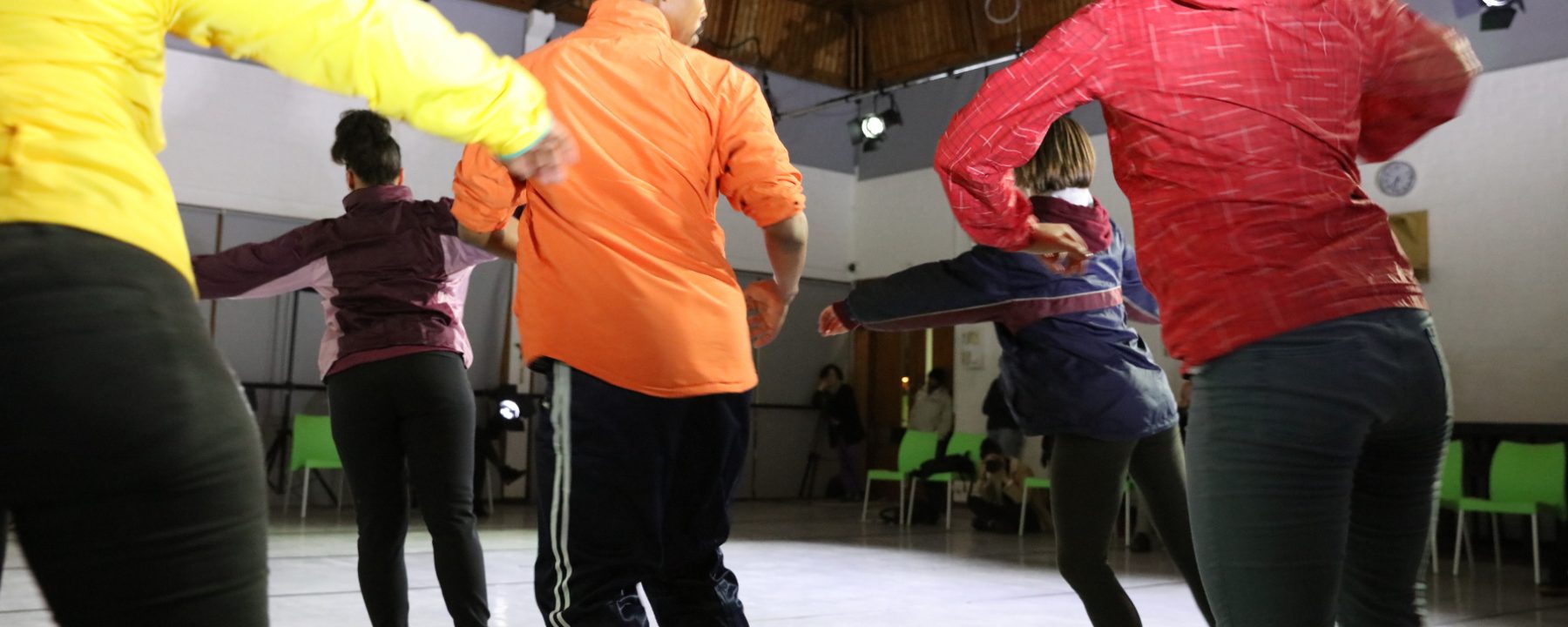“I think it’s high time we start to address that dance, movement and embodied politics all form part of re-imagining and re-defining where, how and why bodies can occupy space.”
This quote is from an interview with co-founder of ANY BODY ZINE (ABZ), Nicola van Straaten. She, along with Kopano Maroga and Julia de Rosenwerth, started the online and print publication with the desire to bring more cultural and social attention to artistic work that is rooted in the body, “but also a desire to expand ideas around what kind of bodies are dancing bodies.” The intention is to emphasize that every body is a potential site for “creative self-actualization” and “open understandings of dance”.
Having met during their time at the then UCT School of Dance, Nicola proposed the idea of the publication to Kopano and Julia. Since then they have released 10 issues, all dealing with varied aspects of dance, choreography, movement, and bodies through written contributions and interviews with people from different aspects of their industry. Every issue has a central theme that offers guidance to contributors, and a direction for the curation of each issue. Kopnano explains that the themes are based on their interests at different moments, making each issue a reflection a way of thinking at a particular moment in time. Volume 2, comprised of four issues so far, is focused on verbs that relate to dance and movement – Marching, Falling, Jumping and Hanging. Nicola explains that they chose verbs because they were interested in the intersection between language and movement, action and motion.
Previous issues from Volume 1 have included conversations about semantics, emotions, body politics and taboo subjects, offering a wide variety of entry points for conversations. The issue titled “Space/Place” tackles the semantic and political differences invoked in the use of “space” versus “place”, and connects to the act of curation and place making. The issue, “Rhythm” looks at sound and music makers within their community, and includes features on the Phillipi Music Project, a computer engineered rhythm making program by Mohato Lekena and performer and musician Coila-Leah Enderstein who features a lot in their issues, and who Kopano describes as a “kind of ad hoc, fourth member of ABZ”. The issue, “Sex”, arose from an interest in interrogating perceptions of the naked body in performance, specifically how it is always read through sexual references even when the intention of a performance has nothing to do with this. Other issues have explored topics such as race, colour, subjectivity, objectivity, the personal and the political.
“There are so few opportunities for people to share their creative work that isn’t easily consumable or sellable, which I think is why folks are always really keen to contribute,” Kopano explains while reflecting on how they ask people in their community to contribute to the publication. The publication is also a platform to bolster the profile of practitioners who are a large part of the growth and development of dance and movement and related practices in Southern Africa. They have conducted interviews with dancer and choreographer Rudi Smit, strange and intellectual performance artist Gavin Krastin and filmmaker Jenna Bass just to mention a few.
Julia, Kopano and Nicola each contribute in different and important ways to the project. “Julia’s incredible choreographic eye for detail (and the fact that she basically taught herself web design) make her the boss of the website. Kopano’s amazing relational qualities and ability to hold spaces have resulted in him doing a lot of the liasioning with our contributors, stockists and general public, lately he’s also been directing the kind of ‘business’ development of the zine. And my passion for books and print mean I head up the layout and printing aspect of the work. We all edit together, make decisions together, essentially ‘lead’ the project together,” Nicola explains.
Connected to the online and print publication is the third wing of ABZ, the performative platforms. ANY BODY ZINE has collaborated with NEW DANCE LAB, to create the ANY BODY DANCE LAB – a 6 week dance and performance residency for Cape Town-based artists. Teaming up with Theatre Arts Admin Collective and the Goethe-Institut Johannesburg, the residency comprises of a series of dance, composition, writing and performance workshops that culminate in a series of public performances by the 10 participants on the residency. The content from the writing workshops will be compiled to form a publication produced by ANY BODY ZINE. “We wanted to include a writing component to the ANY BODY DANCE LAB and thought that it would be very special if we curated a publication to contextualise and archive the project, but that also provides a platform for the residents to publish some of their work. As ANY BODY ZINE, we are also interested in the processes of content creation and saw this as a good opportunity to explore that question further,” Julia explains. What connects all three aspects of their work is the desire to make space for and to support independent artists.
Julia also informed me that after a fantastic Thundafund Campaign [Thundafund is a crowdfunding platform in South Africa], they were able to print their 2016 and 2017 content which will be available at the Book Lounge in Cape Town on Roeland street and Bibliophilia in Woodstock. ANY BODY ZINE will also be available for purchase at the Association for Visual Arts (35 Church street, Cape Town) during their Comics Focus zine and comics festival taking place from the 21st of June to the 19th of July.
Reflecting on their intentions for the publication, Nicola expressed that they hope it will allow people to think about their bodies differently and perhaps see dance as a more accessible medium. The publication presents itself as an archive of South African performance and movement practices, showcasing an image of the contemporary history of dance and beginning the documentation of SA’s dance lineage. The platform also offers validation for those already deeply involved in the industry and the possibility for opportunities for emerging artists.
Check out their website to find out more about their upcoming projects.
“In our current neoliberal context, dance really doesn’t get as much support as fine art or even film, because it isn’t necessarily a ‘sellable’ product. But that’s also why it’s such a powerful tool, because dance is an experience and has the potential to be internally transformative in that way.” – Nicola van Straaten

